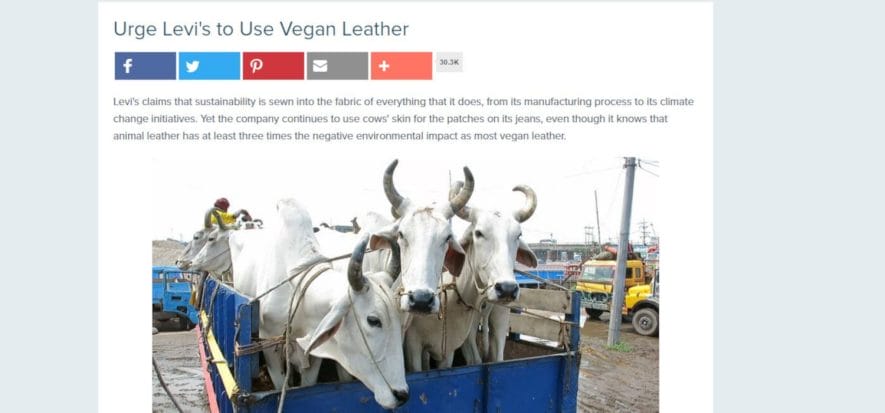While celebrating their return to Wall Street, Levi’s top managers have been facing, at the same time, one more problem. For the records, on March 20, 35 years after the company delisting, which took place in 1984, they listed again the denim and cowboy apparel brand at the New York Stock Exchange. That is part of a wider plan to expand the business, which also aims to buy out some new brands. Yet, unfortunately, shortly after the end of the stock IPO, Levi’s found out that PETA was one of their shareholders.
The usual tactics
At this point, we well know the modus operandi of the animal-rights association, as they played that way with Prada and Hermès as well. What is their strategy? PETA buy a minimum share of stocks to be entitled to take part and speak in the shareholders’ meeting. In doing so, they successfully manage to bring their own claims into the company.
The issue is about labels
PETA’s activists have been already raising their voice, as they want Levi’s to stop using leather to make labels on their denims. Ironically enough, they are focusing on a particular of minor importance, even though they are standing up against a brand specialized in the manufacturing of leather footwear, accessories and apparel. Fair enough. In the name of their vegan extremism, PETA ask the US brand to “spare” bovines.
Their reasoning
One can expect everything from such association: in fact, they even asked dictionary editors to revise, for their own purposes, the definition of the “leather” term. Likewise, they are playing again the way they usually do. While asking Levi’s to give up leather, their petition is full of inaccuracies. Two of them are most relevant indeed. PETA claim that “leather environmental impact is considerably more negative, compared to most vegan alternative materials”. Any data to support such thesis? None at all. Nevertheless, animal-rights activists go even farther: in their opinion, “we cannot consider leather to be merely a by-product of the meat industry. It is a related product, which is often more profitable than the animal’s meat itself”. People who are really into the meat-leather industry, and are aware of the traditional and praiseworthy circularity of tanning, soon realize that PETA’s remark does not make sense. Yet, they might deceive someone who is not that expert about it.
Strength and tenacity
In the past days, LVMH, Hermès and Prada proved strong and tenacious enough to fight back PETA’s pressure while making their own choices. Levi’s are about to face a new challenge. We hope that they will be strong enough not to give in.










